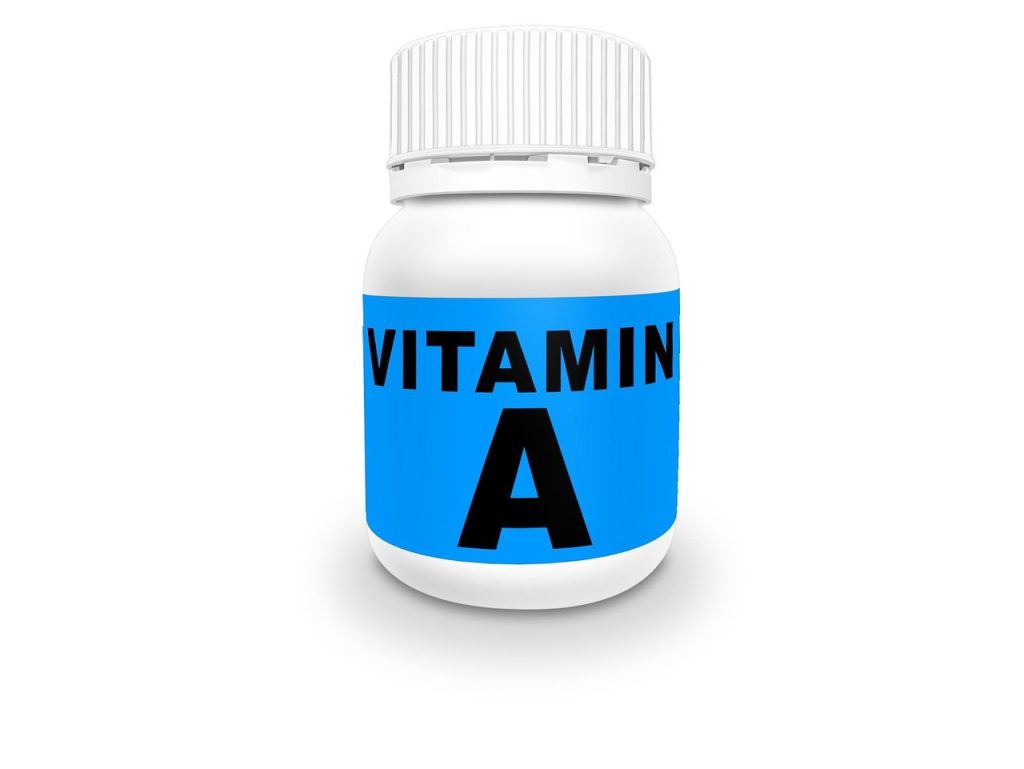Vitamins are organic chemical compounds that are necessary for the proper functioning of numerous processes of human metabolism. These substances must be supplied from the outside, as the body is not able to produce them on its own. For this reason, in the case of an improper diet or the presence of certain diseases, there is a risk of developing vitamin deficiencies, which can significantly affect the patient’s health.
Vitamin A – what is it?
Vitamin A is an umbrella term for a group of chemical substances, of which retinol, retinal and certain carotenes are the most important for the human body. These chemical compounds are involved in numerous metabolic processes in the human body, which affect the proper health of many systems and organs.
One of the most important functions of vitamin A is its participation in the functioning of the organ of vision by producing nerve impulses in the retina of the eye under the influence of light. Thanks to this, it is possible to receive light stimuli and convert them into an image in the right brain structures. In addition, vitamin A participates in processes related to the regulation of the function and maturation of cells and epithelium. Through this action, vitamin A determines the maintenance of healthy skin, nails and hair.
This compound also affects the proper functioning of the immune system, which is the body’s basic protection against diseases caused by infectious agents, such as viruses or bacteria. Certain cells of bone tissue are also sensitive to the action of vitamin A. Thanks to this, this compound is involved in the process of bone growth and affects their proper formation and maintenance of structural integrity.
Vitamin A – occurrence
The human body is not able to synthesize vitamin A on its own – for this reason, it must be supplied with food. Due to the mechanism of storage of this vitamin, the highest amount of vitamin A is found in products of animal origin that are produced using their liver, such as fish oil. Vitamin A is also present, m.in, in cheese, milk, eggs and butter. Additionally, high concentrations of this compound are found in the following vegetables and other plant foods:
- Carrot
- Sweet potatoes
- Spinach
- Pumpkin
- Paprika
The daily requirement for vitamin A depends on many factors, m.in age, sex and physiological condition (pregnancy or breastfeeding). For this reason, the possible initiation of additional vitamin A supplementation must be analyzed individually and consulted with a doctor each time.
Vitamin A test – when to do it?
Testing the concentration of vitamin A in the body is recommended for people who suspect that they may suffer from a deficiency or excess of this vitamin. These conditions are called hypo- and hypervitaminosis, respectively. Each of these disorders is characterized by a separate set of clinical symptoms and is associated with the risk of developing specific health complications. Due to the influence of vitamin A on the proper development of the fetus, it is also important for women planning and being pregnant to take care of maintaining proper concentrations of this substance in the body. In addition, the determination of vitamin A levels should be performed before and during its supplementation in order to assess the effectiveness of the implemented treatment.
Symptoms of vitamin A deficiency
Currently, vitamin A deficiency is rare in the so-called highly developed countries, but the possibility of this syndrome should always be taken into account, especially in the case of co-occurrence of eating disorders and other diseases affecting the function of the digestive system. In the case of vitamin A deficiencies, the following symptoms can most often be observed:
- Twilight blindness (formerly called „night blindness”) – significantly impaired vision in low light conditions,
- Dry eye, which can lead to irritation and inflammation
- Frequent, recurrent infections with a more severe course,
- Deterioration of skin condition – excessive dryness, flaking, acne,
- Increased brittleness and hair loss,
- Tooth damage, enamel atrophy.
Excess vitamin A – symptoms
Just like deficiencies, an excess of vitamin A is also not beneficial for the functioning of the human body. Most often, its development occurs in the course of improperly conducted supplementation of this compound with the use of over-the-counter dietary preparations. In order to avoid health complications associated with it, it is always worth consulting a doctor and performing appropriate diagnostic tests before deciding to supplement your diet with additional amounts of vitamin A. The most common symptoms that may appear in the course of hypervitaminosis A are, m.in:
- Deterioration of appetite,
- Excessive excitability, nervousness,
- Headaches
- Visual disturbances
- Nausea, vomiting,
- Chronic fatigue
- General weakness,
- Hypersensitivity to sunlight,
- Increased risk of bone fractures.
Excess vitamin A poses a significant threat to the patient’s health. In extreme cases, it can lead to the development of disorders that can directly result in death, such as liver damage or an increase in intracranial pressure, m.in. In addition, hypervitaminosis A is especially dangerous during pregnancy. Excess vitamin A in the mother’s body has a teratogenic effect. This means that it can lead to the development of numerous, irreversible birth defects in the baby or result in premature birth or even miscarriage. For this reason, during pregnancy you should never make a decision on your own to include any additional supplementation and always consult your doctor in charge of the pregnancy.

